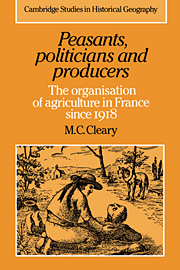Book contents
- Frontmatter
- Contents
- List of figures
- List of tables
- Preface
- Abbreviations
- Base map of the départements of France
- Introduction
- 1 The transformation of rural France
- 2 Individuals and associations in the farming community
- 3 Agricultural associations before 1914
- 4 The heyday of the regional unions, 1918–1930
- 5 The economic crisis and the rise of corporatism, 1930–1940
- 6 Agricultural associations under Vichy, 1940–1944
- 7 A rural revolution? Syndicates and cooperatives, 1944–1965
- 8 The deceptions of progress, 1965–1985
- 9 Representing the community – the place of salaried labour and women
- 10 Conclusion
- Notes
- Bibliography
- Index
6 - Agricultural associations under Vichy, 1940–1944
Published online by Cambridge University Press: 28 October 2009
- Frontmatter
- Contents
- List of figures
- List of tables
- Preface
- Abbreviations
- Base map of the départements of France
- Introduction
- 1 The transformation of rural France
- 2 Individuals and associations in the farming community
- 3 Agricultural associations before 1914
- 4 The heyday of the regional unions, 1918–1930
- 5 The economic crisis and the rise of corporatism, 1930–1940
- 6 Agricultural associations under Vichy, 1940–1944
- 7 A rural revolution? Syndicates and cooperatives, 1944–1965
- 8 The deceptions of progress, 1965–1985
- 9 Representing the community – the place of salaried labour and women
- 10 Conclusion
- Notes
- Bibliography
- Index
Summary
The fall of France in June 1940, and the arrival in power of Pétain, marked the end of the Third Republic and the establishment of a regime whose central theme of ‘Travail, famille, patrie’ emphasised a return to the supposed moral order, conservatism and peasant values of the nation. That nation, wrote Pétain, ‘will recover all its ancient strength through contact with the soil’. The myth of peasant unity, of a timeless rural France betrayed by the cynical manipulations of corrupt politicians, was a central part of both the ideology and policy of the new regime. But these quasimystical pronouncements in favour of a peasant France wedded to a traditional, Catholic morality sat, at times uneasily, with a policy towards agriculture and its institutions which was sometimes radical and farreaching. Any judgement of the four years of Vichy cannot ignore this fundamental paradox.
As in the preceding decade the economic conjuncture was highly unfavourable to French agriculture. The Occupation engendered a series of chronic crises in the agricultural sector. Manpower shortages were acute – a large number of agricultural workers were held prisoner (some 700,000 according to one estimate). German requisitions of agricultural produce were considerable – annual totals of some million hectolitres of wine, 7 million quintaux of wheat and 15 per cent of all milk production were withdrawn from France. Even though, as Milward notes, ‘the Germans met with passive, undeclared and often unperceived resistance on the peasant farm’, such losses could not be avoided.
- Type
- Chapter
- Information
- Peasants, Politicians and ProducersThe Organisation of Agriculture in France since 1918, pp. 92 - 103Publisher: Cambridge University PressPrint publication year: 1989

